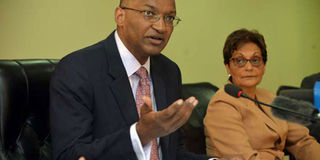Banks must be regulated to lower rates; they will never do it of own volition

Central Bank of Kenya Governor Patrick Njoroge (left) and Diamond Trust Bank chief executive officer Nasim Devji at a press conference on interest rates at Kenyatta International Convention Centre in Nairobi on August 10, 2016. PHOTO | SALATON NJAU | NATION MEDIA GROUP
What you need to know:
- Outcome of debate must result in formula that does not leave interest rates regime in hands of the price-fixing cartel operated by the banks.
- There must be some form of regulation.
The point is, ladies and gentlemen, that greed – for lack of a better word – is good. Greed is right. Greed works. Greed clarifies, cuts through, and captures the essence of the evolutionary spirit.
Those famous words uttered by the character Gordon Gekko in a film about the freewheeling methods that Wall Street operatives use to make their billions, offer a simple explanation as to why Kenyan banks cannot, on their own, be trusted to stop charging extortionate interest rates.
The Kenyan banking industry is run along ultra-capitalist lines and management decisions are solely driven by the desire to make the most gargantuan profits possible.
There is nothing wrong with that except that, because the behaviour of banks has a huge impact on the economy, central banks around the world see it as their role to regularly intervene to rein in the banks and determine the interest rate regime because the level of liquidity in any market has a telling impact on the overall state of the economy.
The debate on the Bill proposing to cap interest rates should be seen as a reflection of the Central Bank of Kenya’s failure down the years to effectively regulate the banking industry.
For far too long, the central bank has served as a club that represents the interests of the banks and not those of wananchi, much as the Organisation of African Unity was dismissed as a trade union of dictators.
Take one example. CBK Governor Patrick Njoroge recently announced that three banks were fined for failing to report the suspicious transactions that fuelled the National Youth Service scandal.
Each was asked to pay Sh1 million which Dr Njoroge explained was the maximum fine, presumably under the CBK Act. A fine of Sh1 million for such a serious matter is laughable.
It is like declaring that motorists will have to pay Sh1 per kilometre as a fine for exceeding speed limits so that someone driving at 120km/hour in an 80km/h section pays a fine of Sh40. There is no deterrent value.
By contrast, since the 2008/9 financial crisis, regulators in places such as America have used stiff fines to force a change in the behaviour of banks, understanding that only the threat of punishment can change behaviour.
TALLIED FINES
The Financial Times tallied these fines and found that between 2007 and 2014, banks had paid $150 billion in fines. This is a major chunk out of the $700 billion in profits they made in that period.
In one case, the giant HSBC bank was caught facilitating transactions by Mexican drug cartels, a charge not too dissimilar to the one the Kenyan banks faced in the NYS saga. The difference is that HSBC was ordered to pay a record fine of $1.9 billion (Sh190 billion).
Jude Njomo’s Bill seeking to cap interest rates has divided opinion. But at least there is common ground that the banks are exploiting Kenyans.
That’s the opinion of the World Bank. It is shared by respected professional bodies such as the Institute of Certified Public Accountants of Kenya.
More pertinently, it is also a view taken by the Central Bank which, in its Monetary Policy Report, routinely complains that “there is still scope for banks to reduce their (interest rate) spreads”.
The trouble with this language that the CBK uses is that it poses as though it has no tools to rein in the banks. The government obviously has a lot of leverage in this field and Kenyans can be forgiven for concluding that those in power prefer to protect their own interests rather than doing what is right for the wider public.
Like the Brazilians, the government can lean on the financial institutions in which it has a major stake to charge the rate recommended by the Central Bank, forcing the private players to do the same.
Treasury can reduce its appetite for domestic borrowing. Government can reward and punish those banks falling out of line by offering and denying the huge deposits state agencies operate in commercial banks. The best thing about the Njomo Bill is that it ends this cozy dance that the government, CBK and the banks have been playing for far too long.
I don’t know enough to say whether the Bill in its current format will work properly or whether the dire effects critics claim it would have are realistic or mere fear-mongering.
The point, though, is that the outcome of this debate must result in a formula that does not leave the interest rates regime in the hands of the price-fixing cartel operated by the banks.
There must be some form of regulation. Left to their own designs, the banks will just be guided by the time-tested credo in the financial industry that greed is good.
[email protected]; @mutigam





